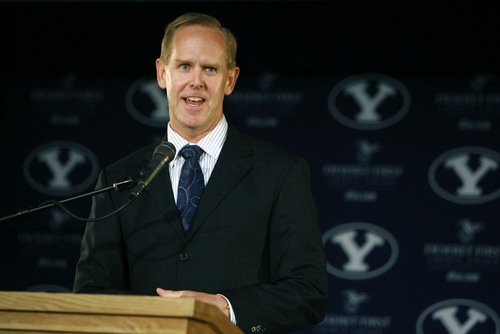This is an archived article that was published on sltrib.com in 2014, and information in the article may be outdated. It is provided only for personal research purposes and may not be reprinted.
BYU made a move forward this week when athletic director Tom Holmoe announced that school administrators and spokespersons would no longer make comment, confirming or denying, when athletes violate the school's honor code.
They deserve praise for that move.
They're partway home, but only partway.
Everybody around here knows, unfortunately, the past stories, substantiated by university reps, of Harvey Unga, Brandon Davies and Spencer Hadley and their struggles with the strict behavioral standard BYU endorses and enforces, including the prohibition of premarital sex, alcohol use and drug abuse, not to mention a list of other thou-shalt-nots. Everybody also knows that certain parties at the school used those violations to publicly promote the school's demanding adherence to the code, underscoring that BYU would not be hypocritical, would not compromise that compliance, come what may to the individuals, even as those athletes were punished and embarrassed, trotted about as remorseful and repentant transgressors.
It was a bad look for BYU. But, even worse, it was bad policy.
It was beneath what the school should and can be.
I wrote numerous columns on those sad cases, calling for reform, calling for quiet, calling for an open hand, not a clenched fist, to be extended to those athletes, calling for an end to the sideshow as BYU made the monkeys dance for a national audience. Zealots and apologists attacked back, blaming the media for reporting the violations, and blaming the perpetrators, saying the code is the code, that students sign it and must live — and suffer — by it.
But something else happened, too: Many savvy Mormons, some associated with and employed by BYU, concurred with those calls for a better way. They found both the unrelenting practice and the self-congratulatory show distasteful and disturbing, well outside the spirit of what BYU, in specific, and the LDS Church, in general, stand for.
They were right then.
They're still right.
The harsh public humiliation of those athletes was too punitive. Making no comment about their absence from the court and the field would have helped. But there's more the school can do. It can allow athletes to go on playing, even when their humanness reveals itself in violations of the code, even as they work their way through their challenges, so no one — not even some coaches or teammates — knows about the details of their spiritual shortcomings.
It's the individual's business, and the individual's alone.
Everybody suffers those shortcomings, to varying degrees, and those shortcomings are bound to emerge hard against a set of standards that are stricter at BYU than the standards put upon the LDS population as a whole.
Athletes — and all students — at BYU should be treated the same as church members around the globe when they fall short of the perfect standard. My experience in the LDS Church, from an insider's view of church governance, has plainly seen huge amounts of love and mercy served up to those who struggle. Those problems are handled and helped in confidence — more with a private embrace than any kind of severe public reproach — between an individual, his ecclesiastical leader and his God. Again, love and mercy, and privacy, are the rule.
With the use of his faith, the individual makes course corrections — and spiritual progress, usually without outsiders knowing the deal.
That's the way it should be at BYU, as well.
In fact, the long reach of the honor code, as it is presently administered needs to be adjusted. I know bishops at BYU who do not and will not pass along to the honor code office names of students and athletes who have run afoul of the code. They simply and dutifully help members of their flock, even in cases where they tote a football or shoot a basketball, along their way — in the confidence that is true to their call. It's the Christian thing to do.
That's the whole step BYU should take.
There are elevated roles in the LDS Church in which the exact expectations for behavior of certain individuals are amplified, such as full-time missionaries. Playing football or basketball at BYU might help the missionary cause of the LDS Church, but it is not, in and of itself, an official missionary calling. In fact, more than a few of those athletes aren't even members of the LDS faith. So, why should they be held to a loftier or different standard than church members?
Unless they are predators or lawbreakers, they should be allowed to give themselves over, according to their own conscience, to God and ecclesiastical leaders to help them ebb and flow, stride and ricochet though their spiritual sojourn on this terrestrial orb — without anybody forcing them, threatening them with expulsion, or ratting them out.
Would there be some resultant abuses? Of course there would. Just like there are now. But by doing its business this way, BYU would be in direct alignment with the faith it represents, and everybody would be treated with that gentle, open hand. A clenched fist, thankfully, would be nowhere in sight.
GORDON MONSON hosts "The Big Show" with Spence Checketts weekdays from 3-7 p.m. on 97.5 FM/1280 and 960 AM The Zone.
Twitter: @GordonMonson



